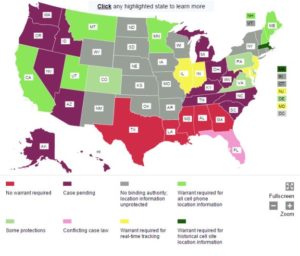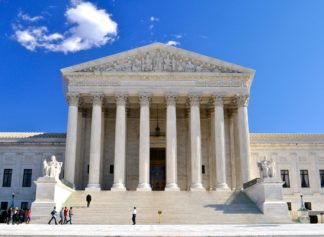Which states can track your cellphone location without a warrant? Well, it depends. When one considers how Black people are overly policed and excessively monitored, it is an important question that deserves some answers.
The ACLU has put together an interactive map which tells the story, state by state. The states with absolutely no warrant requirements for cell phone tracing location are Texas, Louisiana, Mississippi, Alabama and Georgia. Interestingly, all of these states are in the South, states in the former Confederacy.
The states with the strongest warrant requirements for tracking cellphones are California, Maine, Minnesota, Montana, New Hampshire and Utah, with courts requiring warrants for both historical and real-time calls.
Massachusetts protects one’s cellphone location data for historical tracking but not real-time tracking. In addition, other jurisdictions, including Illinois, Indiana, Maryland and New Jersey require a warrant only for real-time tracking. In the remaining states, there is no binding authority on the status of your privacy protections, and your cellphone location information is not protected.
The ACLU notes that in Florida, state and federal courts are at odds over the issue. Meanwhile, in a number of states there are cases pending: Alaska, Arizona, Hawaii, Idaho, Kentucky, Michigan, Nevada, North Carolina, Ohio, Oregon, South Carolina, Tennessee, Washington and West Virginia.
Forbes reported this week that the U.S. Supreme Court declined to hear a case on the legality of cellphone location data retrieved without a warrant, which means the privacy of individual citizens is now left in the hands of lower courts. The case arose from 2012, when prosecutors used cellphone data from Metro PCS to connect Quartavious Davis, who is Black, to locations of a series of armed robberies in southern Florida.
Davis was convicted by a district court as a result. Davis’ attorneys and privacy advocates made the case that the action by officials was an unreasonable search and seizure and a violation of the Fourth Amendment, and wanted a ruling that law enforcement agencies should be required to establish probable cause before wireless companies and other third parties hand over such data. However, the 11th U.S. Circuit Court of Appeals ruled that officials did not violate Mr. Davis’ Fourth Amendment rights. Since the Supreme Court refused to hear the case, the appeals court ruling stands for now, but may be waiting to hear a case from the 4th Circuit federal appeals court which contradicts Davis’ case.
In a similar case, United States v. Graham, a three judge panel ruled that law enforcement needs a warrant to obtain cellphone location data from a third party.
“The Appellate Court held that Davis did not have a reasonable expectation of privacy in his cell site location information,” said Jennifer Lynch, senior staff attorney with the Electronic Frontier Foundation, to Forbes. “What that means is that according to the 11th Circuit, the Fourth Amendment of the U.S. Constitution doesn’t protect your location information when it is stored with a third party provider, like a cellphone provider.”



